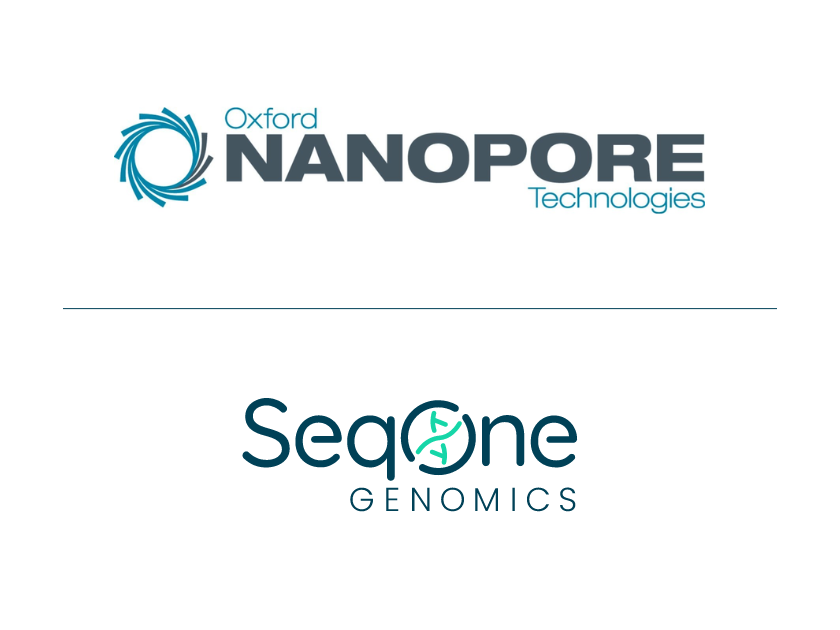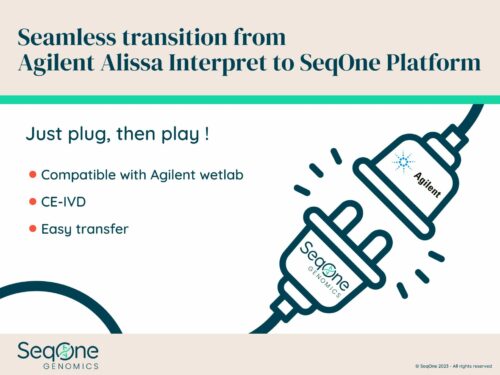Oxford Nanopore Technologies and SeqOne partner to support interpretation of nanopore sequencing in clinical use

A new partnership will provide end-to-end solutions from sample to report for whole genome nanopore sequencing reads at scale in future clinical applications, including rare disease and oncology
11 March 2024
Oxford Nanopore Technologies plc (Oxford Nanopore), the company delivering a new generation of nanopore-based molecular sensing technology, and SeqOne, the leading AI-driven genomic decision support software, today announced a new partnership enabling end-to-end analytical workflows from sample to report, focusing on rare diseases in the short-term and oncology in the longer-term.
Available today on SeqOne’s platform, the germVar application enables AI-enhanced whole genome variant interpretation from Oxford Nanopore EPI2ME™, currently for research use only (RUO).
SeqOne’s germVar offers precise and comprehensive variant analysis for single and family cases (CNV, SNPs, INDEL, SV, STR) within an advanced and intuitive interpretation hub (phasing display, in-silico panels, advanced viewers, gold standard scores, and variant knowledge base).
Designed to streamline whole genome variant interpretation at scale, SeqOne DiagAi (RUO) saves time and reduces costs by ranking, shortlisting, and suggesting causative variants with best-in-class accuracy. It also enables one-click HPO extraction from clinical notes with the DiagAI Notes2HPO large language model.
After a successful test period with early adopters, germVar is now readily available for free trial testing within molecular diagnostic laboratories.
With currently more than 9,000 different rare diseases recognised, and counting, the Developing Nations Working Group of the Undiagnosed Diseases Network International (DNWG-UDNI) estimates that up to 50% of patients with a rare disease remain undiagnosed even in advanced clinical settings where genome sequencing techniques are applied routinely. This collaboration will simplify the analysis of nanopore sequencing data and will bring the benefits of richer, more complete data to enable the characterisation of rare diseases.
In the future, the collaboration will deliver other variant interpretation applications addressing the needs of cancer predisposition and somatic analysis.
In parallel, leveraging its best-in-class bioinformatics capabilities, SeqOne also announced its global Research Partnership Program that will leverage Oxford Nanopore Adaptive Sampling’s data-rich insights to develop custom bioinformatic pipelines, working closely with the medical community and life science companies to improve diagnostic yield and patient care pathways.
An example of such research partnerships includes a collaboration with Pr Laurent Mesnard, Nephrologist at the APHP. Sorbonne Université, Paris and Co-Director of the National Centre for Thrombotic microangiopathies, to improve aHUS rare disease diagnostic yield and care pathway with a custom, patent-pending, bioinformatic pipeline enabling CFH tandem double hybrid detection.
Gordon Sanghera, CEO, Oxford Nanopore Technologies, commented:
“We are excited to collaborate with SeqOne to provide end-to-end solutions for our customers in rare disease and oncology. Combining nanopore sequencing data with SeqOne’s AI-powered variant interpretation platform will support the time-sensitive workflows of our clinical customers, and we look forward to advancing their research and supporting future clinical use”.
Martin Dubuc, CEO, SeqOne, commented:
“The partnership with Oxford Nanopore Technologies represents a significant step forward for our Customers in integrating cutting-edge long-read sequencing into their healthcare diagnostics routine workflows and research efforts. This collaboration not only enhances our ability to offer comprehensive genomic analyses but also strengthens our commitment to transforming patient care through innovative, data-rich genomic insights.”
– ENDS –
About Oxford Nanopore Technologies
Oxford Nanopore Technologies’ goal is to bring the widest benefits to society through enabling the analysis of anything, by anyone, anywhere. The company has developed a new generation of nanopore-based sensing technology for real-time, high-performance, accessible, and scalable analysis of DNA and RNA. The technology is used in more than 120 countries to understand the biology of humans and diseases such as cancer, plants, animals, bacteria, viruses, and whole environments. Oxford Nanopore Technologies products are intended for molecular biology applications and are not intended for diagnostic purposes. www.nanoporetech.com
About SeqOne:
SeqOne is a fast-growing deep-tech company focused on turning genomic data into medically actionable insights in oncology and rare and inherited diseases. SeqOne clinical genomic analysis platform, powered by explainable AI, provides genomic labs and healthcare professionals with best-in-class accuracy, usability, and automation seamlessly across lab technologies. By streamlining complex multi-omics analysis workflows, we pave the way for a new era of personalized healthcare at scale, where genetic testing becomes as routine as traditional blood work, radically enhancing health outcomes for all. The company has won numerous awards, including the iLab award and the ARC Cancer Foundation’s Hélène Stark prize. Investors include Elaia, IRDI Capital Investissement, Merieux Equity Partners, Omnes, and Software Club.
www.seqone.com
Contact: media@seqone.com
Forward-looking statements
This announcement contains certain forward-looking statements. Phrases such as “potential”, “expect”, “intend”, “believe we can”, “working to”, “anticipate”, “when validated”, and similar expressions of a future or forward-looking nature should also be considered forward-looking statements. Forward-looking statements address our expected future business, and by definition address matters that are, to different degrees, uncertain and may involve factors beyond our control.
